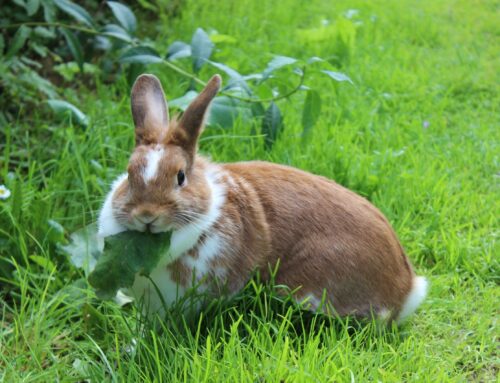Rabbits make rewarding family pets for both first-time pet owners and experienced owners. They are now the 3rd most popular pet in the UK, close behind our beloved cats and dogs. Just like cats and dogs, rabbits also require some vaccinations to keep them fit and healthy. In the UK the two main diseases we vaccinate rabbits against are Myxomatosis and Rabbit Viral Haemorrhagic Disease (VHD). (You can find more information on our pet factsheet pages here)
Myxomatosis is a poxvirus spread by direct contact with infected rabbits or via blood- sucking insects such as flies, ticks, and mites. The virus causes swelling of the skin
and mucous membranes, as well as discharge from the eyes, mouth, nose, and genitals. Rabbits may suffer from the disease for several weeks before eventually dying as it is almost always fatal in unvaccinated individuals. Treatment involves supportive care but is often unsuccessful and results in euthanasia.
VHD is a highly contagious disease caused by a calicivirus. It infects both wild and domesticated rabbits and is spread in the same way as myxomatosis. The virus very quickly infects and kills rabbits sometimes without any clinical signs. Other animals may be subject unpleasant symptoms such as high fever, spasms, and bleeding before inevitably dying. There is no known cure for the condition so prevention is the best practice.
The best way in which you can prevent your rabbit from contracting either of these nasty diseases is by vaccinating them. Currently, in the UK we recommend that your rabbit is vaccinated with a combined vaccine that will protect them against both myxomatosis and VHD. This vaccine contains a weakened form of the two viruses
and works by teaching your rabbit’s immune system how to fight off the disease if they contract the real virus.
It is administered via an injection from 5 weeks of age and starts working 3 weeks after administration. Most rabbits will barely feel the injection as it is done with a very small and sharp needle and is over in a few seconds. Over time the memory in the immune system declines and a booster vaccine will be required. This tends to happen over 12 months so annual boosters are recommended.
Although the vaccines are proven to be very effective, they won’t prevent infection with the viruses in 100% of cases. However, they will greatly reduce the severity of disease caused by a virus, making treatment possible and recovery more likely.
The vaccine should only be administered to healthy rabbits, so one of our vets will perform a clinical exam before administering the vaccine to ensure this is the case. Additionally, the vaccine has not been widely tested in pregnant rabbits or male rabbits intended for breeding. If you intend to breed from your rabbit or suspect they may be pregnant please raise this with us when you book your vaccination appointment and we can discuss with you the best course of prevention for your
situation.
What Else Can You Do?
Vaccination is by far the most effective way of preventing infection with myxomatosis and VHD but a few additional steps can also reduce the likelihood of your pet being affected.
Keeping rabbits indoors greatly reduces the chances of being infected as they are much less likely to come in contact with wildlife and flies. There is still a chance that infection could be carried in on owners clothing or by other pets though, so vaccination is still recommended. However indoor living does not suit all owners and pets so there are still plenty of things you can do to keep your outdoor rabbits safe. Hygienic housing plays a major role in preventing disease. Not only is it much more
pleasant for your pet but it also makes them less appealing to insects such as flies that may carry the disease. It is recommended that you check your rabbit’s housing daily and perform a more thorough clean once or twice a week.
The main source of infection in pet rabbits is biting insects such as flies, ticks, mites, and fleas. Good hygiene will play a role in reducing the prevalence of these nuisances. There are also treatments available to kill and repel these parasites. Spot on treatments like those used on cats and dogs can stop infestations of fleas, mites, and ticks. Not all spot on treatments are safe and effective for use in rabbits though, so it is best to consult your vet before buying these – for example, one of the most common (fipronil) is actually potentially fatal to rabbits. Additionally, flies can be prevented by topical solutions that can be purchased from your vets or local pet shops. Again it is best to check these are safe and effective for use in rabbits and consult with your vet if you are unsure.
Lastly, you should always register your pet rabbit with us. This will allow you to book in for your rabbit’s vaccinations as well as providing you with a reliable professional you can visit if you ever have any concerns over the health of your pet.
Contact us if you have any other questions about keeping your rabbit healthy.



